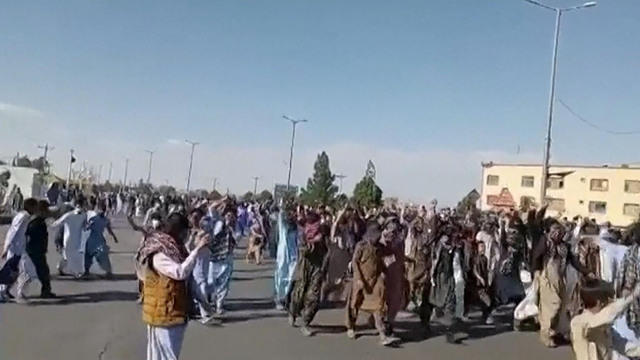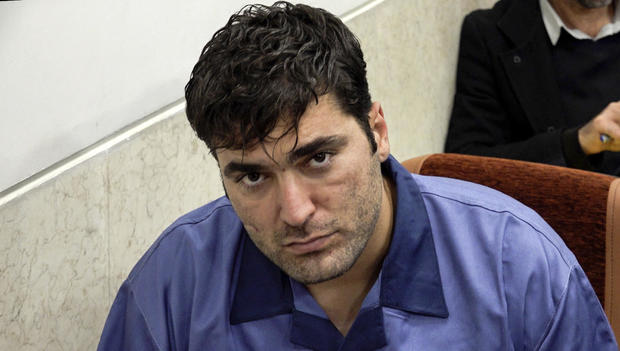Iran on Friday executed three men convicted of killing security force members during protests triggered by Mahsa Amini’s death last year, the judiciary said, drawing condemnation from rights groups.
Majid Kazemi, Saleh Mirhashemi and Saeed Yaghoubi were found guilty of “moharebeh” — or waging “war against God” — for shooting dead three members of the security forces at a demonstration in the central city of Isfahan on Nov. 16, the judiciary’s Mizan Online news website said.
Amnesty International accused Iran of torturing the three men to illicit “confessions” before they were executed.
“Majid Kazemi said in an audio recording from prison that he was forced to make false self-incriminating statements after interrogators beat him, gave him electric shocks, subjected him to mock executions, and threatened to rape him, execute his brothers and harass his parents,” said Diana Eltahawy, Amnesty International’s deputy director for the Middle East and North Africa, in a statement.
Iran witnessed waves of nationwide protests following the September death of 22-year-old Amini, an Iranian Kurd who had been arrested for an alleged breach of the Islamic republic’s strict dress rules for women.
Amini’s cousin, Erfan Mortezaei, who lives in self-exile in Iraq, told CBS News he believes she was tortured.
“She was tortured, according to eyewitnesses,” he claimed. “She was tortured in the van after her arrest, then tortured at the police station for half an hour, then hit on her head and she collapsed.”
During the protests, which Tehran generally labeled as foreign-instigated “riots,” thousands of Iranians were arrested and hundreds killed including dozens of security forces.
Friday’s hangings bring to seven the total number of Iranians executed in connection with the demonstrations.
Kazemi, Mirhashemi and Yaghoubi were arrested in November and sentenced to death in January.
They were also charged with membership of “illegal groups with the intention of disrupting national security and collusion leading to crimes against internal security,” Mizan said.
It noted “evidence and documents in the case and the clear statements made by the accused” showed that “the shootings carried out by these three people led to the martyrdom of three security forces.”
A video shared on social media on Friday showed Tehran residents chanting “Death to the Islamic republic” and other anti-regime slogans. AFP was unable to immediately verify the footage from the capital’s Ekbatan district, a middle-income area that saw repeated anti-regime actions in the past months.
The cases of the three men have caused concern abroad, including in Australia where some of Kazemi’s family live.
His cousin Mohammad Hashemi wrote an open letter to Australian Foreign Minister Penny Wong asking for her support.
“Majid is only 30 years old. He is a compassionate, loving, and strong-willed person. He, like many other Iranians, participated in peaceful demonstrations to raise his voice and demand change,” Hashemi wrote in the letter, published on the petition website change.org.
Wong on Friday condemned the execution, which she said “exemplifies the regime’s brutality against its people.”
“Australia stands with the people of Iran,” Wong tweeted.
“Other protesters will be in danger”
Iran executes more people a year than any other nation except China, according to human rights groups including Amnesty International.
The authorities last year carried out the executions of four protesters, prompting international condemnation.
Since the start of the year, Iran has witnessed a surge in executions on various charges to campaigners’ alarm.
The latest executions “must have serious consequences” for Tehran or dozens of “other protesters will be in danger,” said Mahmood Amiry-Moghaddam, director of the Norway-based group Iran Human Rights (IHR).
“We must make the Islamic republic leaders understand that execution of protesters will not be tolerated,” he said on Twitter.
The authorities hanged 75% more people in 2022 than the previous year, IHR and Paris-based Together Against the Death Penalty said in a joint report in April. At least 582 people were executed in Iran last year, the highest number of executions in the country since 2015 and well above the 333 recorded in 2021, the two groups said.
The frenetic pace of executions in 2023 has not slowed, with IHR recently counting over 220 executions so far this year.
Hengaw, another Norway-based rights group, decried an “unfathomable wave of executions in Iran,” urging in a Twitter message “special attention from human rights organizations as well as Western governments.”
Earlier this month, U.N. rights chief Volker Turk sounded the alarm over Iran’s “abominable” track record this year, with an average of more than 10 people being put to death each week.
Advocacy groups have warned that members of ethnic minorities have been disproportionately targeted in the current wave of executions.



































